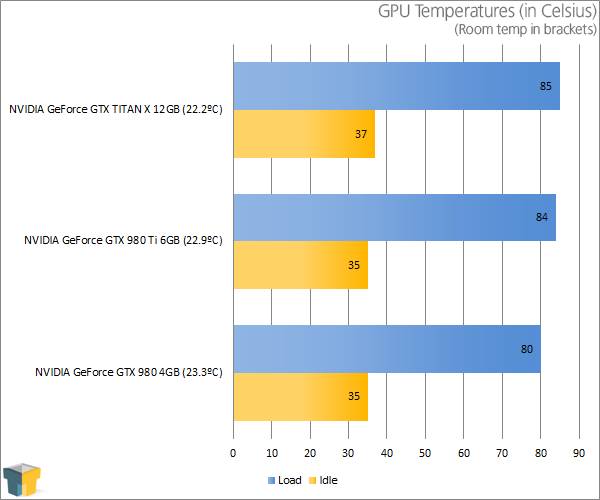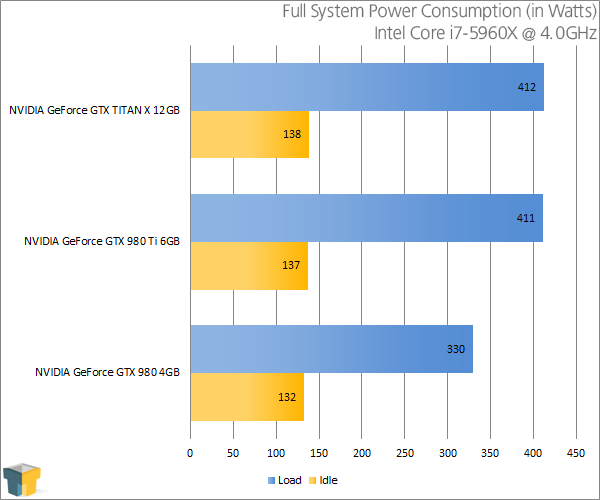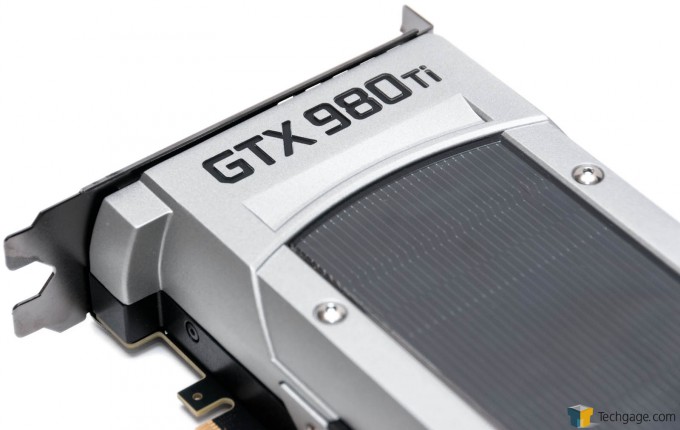- Qualcomm Launches Snapdragon 4 Gen 2 Mobile Platform
- AMD Launches Ryzen PRO 7000 Series Mobile & Desktop Platform
- Intel Launches Sleek Single-Slot Arc Pro A60 Workstation Graphics Card
- NVIDIA Announces Latest Ada Lovelace Additions: GeForce RTX 4060 Ti & RTX 4060
- Maxon Redshift With AMD Radeon GPU Rendering Support Now Available
The New King Of High-end: NVIDIA GeForce GTX 980 Ti Review

In advance of the launch of AMD’s next-generation Radeons, NVIDIA has decided to give gamers another compelling reason to consider GeForce. Its latest card is called the GTX 980 Ti, and its performance comes a lot closer to TITAN X than GTX 980. It sports 6GB of VRAM, costs $649, and could make AMD’s job a lot harder.
Page 8 – Power & Temperatures, Final Thoughts
To test graphics cards for both their power consumption and temperature at load, we utilize a couple of different tools. On the hardware side, we use a trusty Kill-a-Watt power monitor which our GPU test machine plugs into directly. For software, we use Futuremark’s 3DMark to stress the card, and GPU-Z to record the temperatures.
To test, the general area around the chassis is checked with a temperature gun, with the average temperature recorded. Once that’s established, the PC is turned on and left to sit idle for five minutes. At this point, we open GPU-Z along with 3DMark. We then kick-off a full suite run, and pay attention to the Kill-a-Watt when the test reaches its most intensive interval (Fire Strike GT 1) to get the load wattage.


The GTX 980 Ti might be a tinge slower than the TITAN X, but it uses the same amount of power, and considerably more than the GTX 980. On the temperature front, both the Ti and TITAN X peak at the mid-80s, while the 980 caps at 80°C exactly.
Final Thoughts
As mentioned at the outset, NVIDIA is pricing its GTX 980 Ti at $649 – a price $100 lower than what I anticipated. Again, I almost feel like NVIDIA wants to stick it to AMD, and is willing to sell for lower than what we expect because the cards will fly off of the shelves. Or, it could be that NVIDIA knows something we don’t, and that AMD’s Rx 300 (or 400) series is a force to be reckoned with.
It’d be ridiculous to call a $649 graphics card a “good value”, given that’s double what most enthusiasts want to shell out, but when we’re talking top-tier cards, it does strike me as that. The GTX 980 launched at $549, and at the time, I thought even that was well-priced, and now we have a card significantly faster that tacks on only another $100. Well – $150, to be exact, as with this launch, the GTX 980’s SRP has dropped to $499. The GTX 980 Ti might come shy of TITAN X’s performance, but that card retains its $999 price tag.
The 980 Ti is both a difficult and easy card to sum up. If AMD’s next-gen cards were not rumored to launch within the next month, the 980 Ti would without question be a great purchase for any high-end gamer looking to dominate their graphics settings at 1440p or get quality gaming at 4K. But we don’t know what AMD’s cards are going to be capable of.
It could be that the R9 390X (or whatever it will be called) will be underwhelming (despite its HBM implementation), but it could also be that the next Radeons will give NVIDIA’s cards proper competition. While I hope the latter is the case, I have a gut feeling we’ll wind up with the former, simply based on how long its cards have taken to get here. It’s been about eight months since NVIDIA launched the GTX 980 and 970, and at that time, it felt like AMD’s new launch would follow soon after.
Despite hunches and rumor, if I were in the market for a card of this price-range right now, I’d hold off for the next month to see what AMD pulls out of its hat. With Computex kicking off this week, it could be that AMD has some reveals up its sleeves. Let’s hope so.
Based on what’s available today, NVIDIA without question has a seriously attractive high-end option on its hands. It’s nice to see the GTX 980 drop to $500, but if an extra $150 can be squeezed out of your wallet, you’ll stand to gain a serious performance boost.
Pros
- Well priced for its performance.
- 25~30% faster than the GTX 980; just about as fast as TITAN X.
- 6GB framebuffer offers far improved future-proofing than GTX 980.
- A massive upgrade for those wanting to upgrade from GTX 680.
- Power-efficient (~400W at load with an overclocked i7-5960X).
Cons
- Purchasing potential is made difficult with AMD’s next-gen cards (supposedly) launching soon.

NVIDIA GeForce GTX 980 Ti
Support our efforts! With ad revenue at an all-time low for written websites, we're relying more than ever on reader support to help us continue putting so much effort into this type of content. You can support us by becoming a Patron, or by using our Amazon shopping affiliate links listed through our articles. Thanks for your support!






